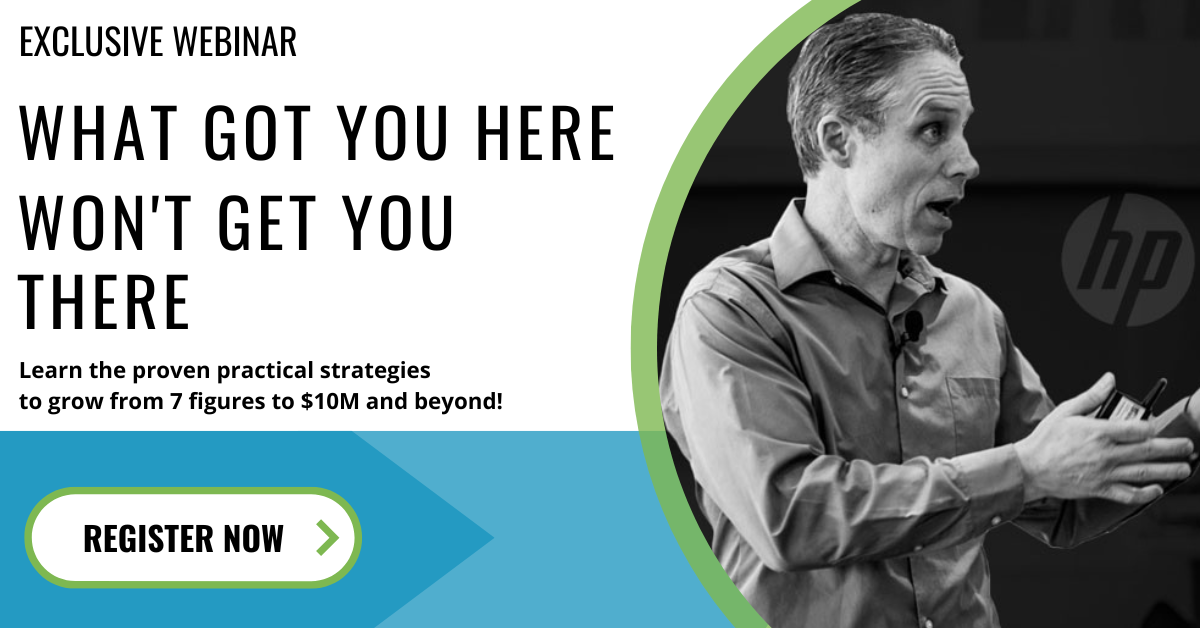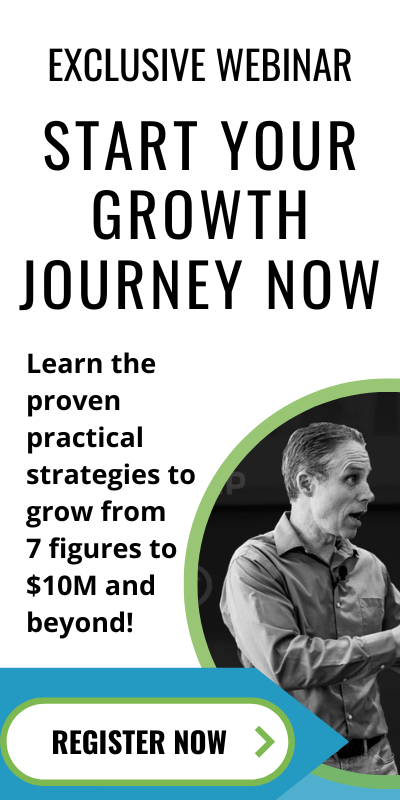Episode 134: Hire A Great Assistant To Optimize Your Genius With Tim Francis
Watch the episode here
Listen to the podcast here
Behind every great leader and entrepreneur is a great assistant. As you continue to grow, having the right people supporting you becomes even more crucial. Tim Francis, the Founder and CEO of Great Assistant, has helped over 500 entrepreneurs get great assistants as their business grows in revenue and as they further scale their teams. In this episode, Tim joins Brett Gilliland to tell us more about the people behind the scenes of success. He equips us with the right questions and answers when searching for a great assistant of your own. What should be your criteria? How should they support you as an entrepreneur to optimize your genius and productivity? Plus, Tim uncovers the six reasons why entrepreneurs delay getting some help and how you can get to the other side of it.
—
As you know every episode, we bring in guests who have great insights for the seven-figure growth journey and now is no exception. We have Tim Francis with us. Tim is the Founder and CEO of Great Assistant. I’ve known Tim for a few years and I’m thrilled to have him as a guest. Thank you so much for joining us, Tim.
It’s my honor. Thank you to be here.
We get to have an especially great conversation about a topic that I know most business owners wrestle with at some point in their scaling journey. It’s one that I have some experience with but I’m going to try not to speak up a ton because I want everybody to hear from you. You’re the expert on this, Tim. Let’s start with this as some context. Most business owners will bring their business forward at the start. They start this thing up, they’re doing everything, all the hats, all the stereotypical things that we always talk about and then at some point, their business gets big enough to where they say to themselves, “I need some help. I got to hire someone.”
Sometimes that’s an assistant. Sometimes that’s not an assistant. Sometimes that’s a salesperson, a marketing person or a product or service person. However they build their team, at some point in time, the business owner has to decide, “Do I keep doing everything that I’ve been doing or is it time for me to get an assistant?” You’ve seen these hundreds, if not thousands of times with business owners over the years.
I would love for you to dissect a little bit, maybe the puzzle, the challenge or the decision that a business owner’s going through when they’re trying to figure out, “Is it the time for me to get an assistant?” I’d love for you to give any additional color to that situation that you think would be helpful. Let’s start to talk about the practical ways that they can think through that decision about whether or not it’s time to get an assistant.
My team and I helped hire assistance for over 500 entrepreneurs. Many of those entrepreneurs have gotten multiple assistance from us. As their business grows, sometimes the assistant needs an assistant. Sometimes the entrepreneur will say, “I’ve got a high performer in my salesperson or my chief of operations.” They’re getting stuck in the weeds. They need an assistant as well. We’ve seen wonderful journeys for clients going from somewhere in 6 figures up into multiple 7 figures and they become Inc 5000 Award winners because they’re able to scale not just revenue and customers but also team and production. That’s oftentimes where our team will come in.
I watched that happen for multiple clients and I also failed with my first five assistants. 1 after the other, 5 in a row. My mom always called me an overachiever. For the last several years for myself, having had an incredibly good experience with my last two assistants, there are some patterns. If we were to start at the highest level, a lot of entrepreneurs think about an assistant as a non-revenue generating expense. In an entrepreneur’s brain, my former self included, I would think, “I can justify spending $80,000 or $100,000 on a salesperson because they’re going to help me drive $1 million in revenue or something like that.” That A-to-B connection is extremely clear.
There was a constellation of realizations I had that took me from struggling and exhausted to happy, fulfilled and feeling free in my business for the first time. I realized that my assistant will always be an expense but my relationship with my assistant is the greatest profit center of my entire life. To go beyond the profit center, it’s crucial that we ask the right question.

Great Assistant: An assistant will always be an expense, but that relationship with your assistant is the greatest profit center of your entire life.
If the question is, “How do I get an assistant,” anybody could go on Upwork.com or ask three entrepreneur friends or on Facebook anywhere and say, “Looking for an assistant. Who’s got a referral?” Within fifteen minutes of going on to Indeed, Upwork or somewhere else, you could have someone apply and you could have an assistant. My stand is that likely you wouldn’t be satisfied if that was the entirety of our hiring process.
That’s because I don’t think most entrepreneurs are looking to get an assistant. That’s the best language that my former self had and that’s the best language a lot of entrepreneurs have. Deep down inside though, what entrepreneurs are looking for is, “How can I get someone to help me spend the maximum amount of time in my day-to-day working in my zone of genius and creating freedom? Not just of time but also of mindshare that I can focus on what matters most, even beyond the four walls of my business.”
I have to tell you that when I see that light bulb switch on for an entrepreneur, it’s like 1,000 other questions suddenly become irrelevant or fully solved. Once we’re thinking about the relationship with our assistant as being a vehicle towards fulfilling our potential and calling, we become not just a great CEO or a leader in our business but also an A-plus performer in our families, maybe in our faith communities, even for ourselves in fitness or wellness or wherever it is that we’re looking for.
I’ve been asked many times, “Tim, what assistances do you hire? Do you hire executive assistants, personal assistants, marketing assistants or office assistants? What is it?” My view is it’s not even the right question in the first place. No disrespect but the more productive question is, “How can we optimize you as the entrepreneur to be fittingly an elite entrepreneur?”
We can take any number of analogies. Back in the day, what was the greatest Michael Jordan could offer? Was it filling out a bunch of paperwork and doing the laundry? No. He was inspiring far more people by doing public appearances. He was producing far more entertainment revenue by working on his jump shot and competing for the Chicago Bulls. He was generating far more enterprise value for Gatorade and Nike by being in their commercials.
That may seem far-flung. There’s only one Michael Jordan or if we want to take a more recent version, one LeBron James. Maybe even a more everyday example would be a surgeon in the room. There’s a surgeon in the operating room and there’s the nurse, phlebotomist and anesthesiologist. There are all these different people playing different roles.
Let’s ask ourselves. Is the world a better and healthier place if that surgeon has the headspace and the time in their calendar to do 1 surgery per week or if they’re able to do 5 surgeries a day? To me, it’s not about the nurse’s work being grunt work or bad work or beneath the surgeon. It has to happen. If the nurse work doesn’t happen, if the janitor work doesn’t happen, if the finance work doesn’t happen, if the person ordering the cautery equipment and the cotton swabs aren’t doing their part, the surgeon cannot do their job.
It’s ultimate respect for the totality of the work that has to happen for this symphony to occur that is our business. From that view of respect and appreciation, step back and say, “What’s my most appropriate contribution to this team, symphony or operating room such that the totality of my organization is doing the highest and best good that it possibly can?” The same is true in our families and all areas of our lives.

Great Assistant: It’s an ultimate respect for the totality of the work that has to happen for this symphony to occur.
If we start standing in that place of high performance, very quickly we realize the extraordinary opportunity cost if we are doing anything other than the surgery itself. If you are prepping the surgery room, you are not doing surgery. If you are doing paperwork, you are not doing surgery and on and on. I’ve heard entrepreneurs before say, “My business isn’t big enough to have an assistant. That’s only for rich people or Fortune 500s.” My view is, “Hold the phone. Do you realize that you are the number one asset? Not just in your life but also in your business and your family?”
You are Michael Jordan or the surgeon. That’s not a comment on social status, personal value or anything like that. That’s the workability. That’s the nuts and bolts of what it means to be a leader inside of your company. You bet we have more happy customers in the world as a better place when you can focus on your talent. Let’s also add, you’re not burnt out.
The surgery analogy is fantastic but if you want to bring it home quickly, you think about all the things that entrepreneurs do to keep their businesses going and the burnout cost of that is huge. You and I talked about this a little bit but on May 16th, 2022, I hired my great assistant. Her name is Callie. She’s fantastic and it changed everything for me.
For me to put up with or live with the reality that I was living for several years before I made that leap, I look at myself and say, “I should have done that sooner.” It’s not even a question. I don’t want to spend too much time on it but I’d like to circle back and have you review with all of us what are some of the reasons that smart entrepreneurs, very value-creating entrepreneurs are delaying the decision to get some help. Why?
I’m going to answer that in two ways. First, we did a survey of 149 entrepreneurs in 2019. We said, “What is your single biggest frustration or challenge in getting an assistant?” I’ll tell you the results of that survey and what’s sitting underneath all of that. First and foremost, there were six areas. This is a little while ago so forgive me if I don’t remember all six. We call them the big six reasons that entrepreneurs struggle with getting an assistant.
Number one, I don’t know how to trust or let go of control. Number two, I don’t know what to pay them and how to make them profitable. Number three, I don’t want to train or deal with onboarding them. Number four was I don’t want to have to manage them, babysit them or fix their mistakes. It seems like I should do it. Number five, I don’t know where to find them, specifically the good ones and the great ones. Number six, I don’t know what to delegate. Brett, I’ll let you guess. Of the 6, what do you think was far and away the number 1 of those 6?
I would say the lack of being able to let go like, “This is my thing. I created it. I don’t even know how to think about somebody else doing this or trust that somebody else could do it as well as I do it.”
One thousand percent. 98.7% of our 149 respondents had 1 or many of the big 6. Of that 98.7%, it was like 55% or 60%. Half of everyone had the very first issue, control and trust. Let’s face it, you’re going to be more skilled at what you do in the exact unique way you do it and the way you like the documents to show, the thing in your calendar, the email and on and on.
You’ve spent 10 years, 15 years or 20 years developing your preferred way of doing things. No one’s going to step in on day one and do it the way that you like it and do it as well that you do it and do it as fast as you do it. If that’s the metric for success, it’s dead on arrival. Don’t even bother getting an assistant.
If that’s the fact, how do we get to the other side of it where we have people going, “That’s the best decision I ever made?” You’ve had hundreds of satisfied business owners and entrepreneurs thanking you for helping them get to the other side of it. We know one side of it. I can’t imagine being able to relinquish control. “That’s frustrating to think that in addition to all the other stuff that I still got to do, I got to carve out time to hire and train this person. It feels so heavy to do it all.” How do we get to the other side where it feels like, “I can’t believe that was the best thing I ever did. Why didn’t I do it sooner?”
Brett, I’m including my former self in this group. I didn’t want to speak on your behalf but I had a feeling.
I’ll volunteer for that.
Once and only once an entrepreneur has an incredibly candid conversation with themselves about the crippling opportunity cost of not having an assistant, then and only then does an entrepreneur get into the incredibly resourceful state that we, entrepreneurs, are known for. When we want to make something happen, heaven and earth move. When someone says to me, “I don’t have the time to get an assistant to onboard and train them,” I’ll say, “I’m okay with your conclusion that it’s not time to get an assistant. I will not agree with your language.”
They’re a little taken aback, “What’s wrong with my language?” I’ll say, “It’s not that you can’t find the time. It’s that you’re not willing to make the time.” As long as someone is not willing to make the time, nothing’s getting done. I don’t mean just getting an assistant but if you’ve thought of writing a book, training your salespeople better or sitting down with your family to talk about succession plans or anything, there are no extra pebbles of minutes in any entrepreneur’s life where we’re bored and looking for something to do. That doesn’t happen.
Entrepreneurs are creative in moving forward and as a group, we’re always with the next big thing. You’re never ever going to find the time for anything that’s important. You will make the time. All of this came into sharp focus for me, Brett, because I had a health crisis where after a couple of pretty hard business failures, I developed a stress-related illness and I couldn’t walk for three months. Had it not been for the full-time care of my family and my mother paying my mortgage for me for three months, I would’ve gone double bankrupt in my personal finance and also in my business. Talk about a wake-up call.
You’re a fit guy. Anybody reading this wouldn’t see you’re a fit guy and I know you’re a collegiate athlete. You’re a healthy guy. You’re a young guy still and back then, even younger. To picture you laid out in bed for three months and unable to walk underscores the severity of it for me. That’s incredible.
If you would’ve looked at my blood markers from the doctor, that’d say, “Perfect bill of health.” If you’d looked at my body mass index for how much fat I was carrying, I’m in the top 5% person in America or Canada. It’s almost any marker except for sleep volume, which was 4.5 hours a night or 5 hours a night and/or stress levels like a self-reported stress report. If you look at anything other than those two, you’d be like, “This guy’s in great shape,” you are good for the next 30 years.
It all went away overnight. That’s not to say that it takes a crippling illness to be a wake-up call. I hope this conversation Brett and I are having can be your wake-up call that you don’t have to get to the point that you cannot provide for yourself or others before you realize that stress and exhaustion is a major chronic issues in our society but especially in entrepreneur culture.
You don't have to get to the point that you cannot provide for yourself or others before you realize that stress and exhaustion is a major chronic issue in our society, but especially in entrepreneur culture. Share on XDon’t let it get that far. Don’t do what I did. Do what Brett did, where Brett took an honest, candid assessment of the world he was in and said, “It’s time to do it.” I’ll tell you, Brett. Probably at least three-quarters of our clients who are running around with their heads cut off and saying, “I don’t have time to do all this onboarding and training,” decide, “Despite that, I’m still going to get an assistant and find a way.” They bring that entrepreneurial creativity, drive and determination. I bet you, within 90 days, at least 75% of them are saying what you said, which is, “Why didn’t I do this five years ago?”
Also, celebrating the day. I walk around saying, “May 16th.” I know the day and Callie gets a kick out of that. I’m always bringing it up because every business owner that I know is trying to create a great business and understands the power of leverage. You talk about a huge point of leverage. Any minute that you can free up from yourself and hand off to somebody else is a leveraged minute over and over again. Especially if it’s a repeatable type of thing, whether it’s daily, weekly or monthly.
As soon as I hand that off, that’s freed up every day, every week, every month for the rest of this arrangement as long as this goes. It’s so amazing that it’s like a gift that keeps on. I’m a strong proponent of doing this but it’s so hard when you’re in the moment. You’re like, “That money’s got to come from somewhere.” It’s like an expense. I’m giving myself a pay cut to bring this person on. As soon as you start doing those higher value activities, there’s more revenue and profit that comes from making the investment but it’s so hard to see it, Tim.
Let’s do a thought experiment and this is for everybody. If you cannot make a business case for how your relationship with your assistant could be profitable in 90 days, don’t get an assistant. There are other things you need to fix in your business first before we accelerate things by adding an assistant or we optimize things within an assistant. I’d like to see an entrepreneur who has customers they could go to resell, has products they could launch, whether it’s a speaking opportunity or some client acquisition opportunity that is sitting unfulfilled.
If their business is less than $100,000 a year, which may sound tiny to some readers, it’s too early. You need to learn more about building acquisition and building revenue and margin and cash before we throw an assistant into the mix. If their business is doing at least six figures and up, seriously, it’s time to think about how do we get an assistant involved. To me, it’s both an emotional exercise and also a mathematical exercise.
The first part is the mathematical exercise. The emotional exercise is starting to confront, “What are some of my limiting beliefs here?” Oftentimes, once entrepreneurs get presented with the opportunity cost of not having an assistant, all of a sudden, it’s like, “Do you mean I missed out on this $20,000 opportunity here? Do you mean I could have picked up my kids from soccer practice? Do you mean I didn’t have to stay in the office dealing with that curve ball all night?”
What it all comes down to underneath it all is an entrepreneur’s self-confidence in themselves like their sense of self-worth. If a surgeon or Michael Jordan had some of the words in their head that a lot of us entrepreneurs have around getting an assistant, they would never be where they are. To be a high performer, we have to look at the outside world and the inside world as well.
Here’s the thing. I’m not going to ask anybody to update their psychology to get an assistant. Sometimes that’s some of the hardest, longest and slowest work. Sometimes it comes in an epiphany. If you’re not willing to do it for yourself, do it for others. Do it for your loved ones at home that get to see more of you, that get to know that you’re not going to burn out and that you’re going to be around for them physically for many years to come.
Do it for your staff who know that they have a calmer leader who can think more clearly and sharply about the business because the mental ram has been lightened, a leader who has time to get away from the business for a couple of days per quarter knowing that their emails are handled, their calendar is handled and that the trains are going to keep running on time.
The business may not grow a bunch in your absence but it’s certainly not going to die either. A leader that can get that space to do deep thinking, deep work to spot where this business has to go in the coming 90 days, in the coming year, maybe even the coming 5 years. Do it for your customers who are going to have a better customer experience because they’re buying from you and your team, who are that much better led and available to implement the elite entrepreneur methodology, tools, tactics, spreadsheets and everything that elite offers.
When you can lead with excellence, you’re not just building great products or services. You’re building a great business and that great business has great people who are supported in every sense of the word. You bet that the goodness that puts in the world is at an elevated level. Do it for those constituents, even if you’re not willing to do it for yourself.
When you can lead with excellence, you're not just building a great product or service, you're building a great business. That great business has great people who are supported in every sense of the word. Share on XIt was easy for me, as I look back on my journey with this. It’s easy for me to defer help to myself and you’ve said that differently. We neglect ourselves as entrepreneurs. We’re looking out for the business. Maybe we’re trying to look out for a family we’re taking care of or other people we’re involved with in the community or a church or wherever else but it’s all other facings. We grin and bear it or we grind or we sleep deprive ourselves to make more room for other things and we put it off because we think, “I don’t need that personally,” but we do need that.
You don’t understand it until you experience the contrast. If not for yourself, do it for all these other people who could use more of you and/or a better version of you when you are showing up for them. Well said. Tim, you’ve given our readers a lot to think about with respect to whether or not it might be the right time for them to get some help or the reasons why they should consider it again if they have written it off.
Let’s say we make the decision to go ahead and get an assistant. These people know there’s such a business called Great Assistant and you can help them find a great assistant. That part of it is very useful. Why don’t you talk to them about what a good routine looks like, either daily or weekly, once you have one to start to offload things from your plate to theirs? Call it onboarding, training or whatever you want to call it. What’s a good rhythm for making this work?
There’s a lot of science to it or let’s say methodology. It’s not some grand mystery like Elite Entrepreneurs’ methodology. There’s quarterly planning that we do. It’s predictable in terms of what that looks like. At every level, whether we’re thinking about daily, weekly, monthly or quarterly, we’re a little constrained with time for this episode for me to be able to go into all of them but I’m happy to maybe give you a few pieces.
First of all, in terms of daily interaction, ultimately, we don’t want to be chased or feel like we have to babysit our assistant, nor do they particularly want to feel like you’re breathing down their necks. It sounds simple but I wouldn’t underestimate the power of a daily report that your assistant submits to you each day that they work. That report is going to cover 4 or maybe 5 questions.
The first question is, “What did you do today?” The second question is, “Where did you get stuck?” The third is, “What can I do to help?” The fourth is, “What are you doing tomorrow?” If you have an hourly person, the fifth question might be, “Did you log your time today,” as a forcing function. When you think about the cycle time, if you are only meeting with your assistant once a week, you have 52 cycles for them to improve, get better and move forward.
On the other hand, if you get a daily report from them every day, it’s lightweight. It’s not super detailed but the highlights are. You get probably 220 cycles where you have an opportunity to make sure that they’re clear on what they should be doing tomorrow. They’re aligned with you on what should happen tomorrow. You’re un-bottlenecking them from whatever they may have bumped into from the day and you’re creating that psychological safety that they know that they can come to you.
A bit of nuance is I do think that “where did you get stuck” and “how can I help you” are two different questions. “How can I help you” maybe build on where did you get stuck. However, “how can I help you” might also be, “When’s the next team quarterly planning?” It is its own question. “What did you do today” creates a nice little bit of accountability. Especially if you’re in a remote situation where you and your assistant are not working in the same office, it can be a nice way, for us as entrepreneurs, to start calming down that sense of, “I don’t want to let go of control. I don’t know if I can trust someone.”
If I’m getting a report every single day and I’m seeing that they’re getting better, improving, moving forward and getting things done, that’s one of many strategies that we have to help an entrepreneur feel like they can start to trust more and more their assistant. That would be a great daily structure that we recommend to all of our clients.
I appreciate that answer, Tim. I recognize after I asked the question that I asked a big question. You’re like, “We could talk about daily, weekly, monthly or quarterly.” There’s a lot that goes into and you took my too large of a question. You brought it right down to a very practical, “Here’s something people can do that’ll help them feel more comfortable handing things off.” Keeping that visibility daily is a great and practical suggestion so thank you for that.
We’ve gone from trying to help people overcome some emotional challenges around the idea or the decision to get some help in the form of an assistant to a very practical way that you can start to hand some things off and feel like things are happening that need to happen and slowly relinquish that control. I appreciate all of the perspectives that you’ve brought to this issue, Tim. I want to thank you for coming to the show.
Thank you for trusting me to able to speak with both, you, Brett and everyone who’s reading. It’s part of my journey to help those that I come in touch with to fulfill their fullest potential and make good on the gifts that each of us has been given, both by the divine and also by our communities, including the parents that helped us grow and our mentors.
Life is a precious thing and so to be able to maximize the opportunity and the gift that is every single day is what’s on my heart. Being able to be here talking about how an assistant can help on that journey is in alignment with my mission. Thank you, Brett. I know that you do tremendous work. You and your team do tremendous work to help fulfill the potential of entire companies. I salute you for that.
That’s wonderful. Tim, will you please let people know the best way to learn more about Great Assistant or connect with you?
By all means. You can check us out at GreatAssistant.com. You can also email me personally at Tim@GreatAssistant.com. Know that if you’re going to send me personal information, my assistant does read all of my emails before I ever see them so just know that you’ll probably hear from Denise first. If it is ultra-confidential in the subject line, make a note like “For Tim’s Eyes Only” or something like that and she’ll make sure that it stays confidential just between you and me.
Thank you for being our guest. For those of you reading, please share, like, review and do all that stuff so that we can help as many seven-figure business owners as possible with the content like we’ve shared with Tim’s help. We want to help as many elite entrepreneurs as possible build meaningful businesses. We want you to keep reading and growing your businesses. Tell others about it. We’ll see you next time.
Important Links
About Tim Francis
 Tim Francis is a college athlete turned Entrepreneur based in Austin, TX.
Tim Francis is a college athlete turned Entrepreneur based in Austin, TX.
He’s been a guest lecturer at NYU in New York City, and has been featured on the websites of Forbes and Inc Magazine.
Want to listen to more? View all episodes here >



